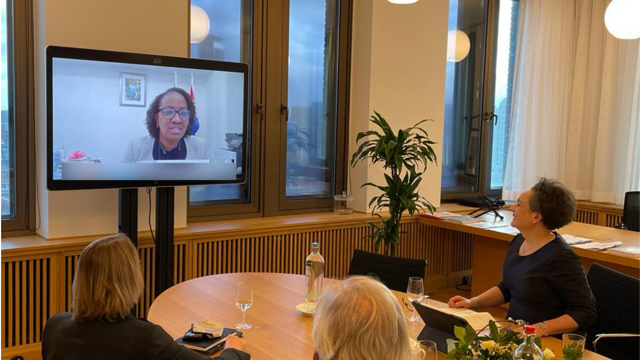Conditions for retracting 12.5 percent salary cut remain a mystery

PHILIPSBURG — The Kingdom Council of Ministers will take a decision about the eight conditions St. Maarten will have to meet in exchange for permission to drop the 12.5 percent salary cut for government employees on June 24. So far, only three conditions have been made public and local politicians like MP Sarah Wescot-Williams demand that the government makes the remaining five conditions public as well.
 According to MP Wescot-Williams, State Secretary Van Huffelen demands that St. Maarten finances the effects of lifting the 12.5 percent-measure from its own budget, that it keeps the 25 percent salary cut for ministers and members of parliament in place and that it adopts the law that regulates the top income for workers at government-owned entities.
According to MP Wescot-Williams, State Secretary Van Huffelen demands that St. Maarten finances the effects of lifting the 12.5 percent-measure from its own budget, that it keeps the 25 percent salary cut for ministers and members of parliament in place and that it adopts the law that regulates the top income for workers at government-owned entities.
“We don’t know what the other five conditions are, because the government wants to discuss them first with the state secretary,” Wescot-Williams states.
The United Democrats-MP points to a statement from the Central Bank that warned that the 12.5 percent salary cut would result in increased impoverishment. “But now we hear that we have to negotiate and there might be a delay because of these extra conditions that are being imposed.”
Wescot-Williams is rather upset that the government refuses to inform parliament about these conditions. From social media, she picked up that Minister of Finance Ardwell Irion apparently is negotiating with the labor unions about payment of the vacation allowance for the period 2020-2021 in exchange for a reduction of vacation days.
The MP does not expect answers from the government ‘any time soon’: “The government is going to play this game and when things don’t work out, they’ll put the blame in the lap of the Dutch government. There is no one who can question the ministers and get straight answers, because if members of the media do it, they are put on notice.”
MP Wescot-Williams points out in her press release that the ordinance the kingdom imposed in exchange for liquidity support can be undone by national decree. Those ordinances regulate the 12.5 percent reduction in labor benefits for civil servants, the 25-percent salary cut for ministers and parliamentarians and the top income for workers at government-owned entities.
“In other words, these ordinances can be revoked by a decision of the government. It does not have to come back to parliament or to be changed by another ordinance.”
MP Wescot-Williams furthermore questions the status of the heavily criticized media policy the government wants to (or has) put in place. She refers to correspondence from the prime minister and a media-representative indicating that the two parties are going to discuss the policy. “But still warnings are issued to a journalist? Is the policy in effect or not? Is the government going to have a discussion with the media, yes or no?”


























